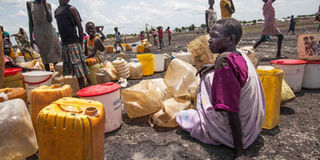Africa under pressure to find ways of resolving problems

Displaced people wait to collect water from a water point in Aburoc, South Sudan on June 5, 2017. PHOTO | ALBERT GONZALEZ FARRAN | AFP
What you need to know:
African countries continues to feature high on the list of those said to be fragile, and the state fragility phenomenon remains a major constraint to development.
Among the causes of conflict and fragility is the fact that millions of Africans are unable to access basic socioeconomic services and opportunities.
As the Western world becomes increasingly introspective, Africa is under pressure to find ways of resolving her problems.
African countries continues to feature high on the list of those said to be fragile, and the state fragility phenomenon remains a major constraint to development.
Among the causes of conflict and fragility is the fact that millions of Africans are unable to access basic socioeconomic services and opportunities.
This is the result of poor governance and injustices that result in lack of inclusivity and equitability in the distribution of national resources.
Unfortunately, there are glaring injustices even in those countries recording impressive economic growth, like Ethiopia, South Africa and Kenya.
A decade ago, most fragile countries were low-income ones, but today almost half are categorised as middle-income.
LAG BEHIND
The world’s fragile states lag behind in almost all development indicators. Statistics show that they are saddled by high malnutrition, child mortality lower primary education completion.
Of the 36 countries featured in the 2016 Fragile States Index, 20 are in Africa.
These countries are home to more than 200 million people or approximately 20 per cent of the continent’s population.
According to the index, Africa’s most fragile states include Burundi, Central Africa Republic, Chad, Somalia, South Sudan, Niger and Zimbabwe.
Others are the Comoros, the Democratic Republic of Congo, Guinea-Bissau, Madagascar, Congo, Sudan and Togo.
SERIOUS HINDRANCE
Many fragile countries risk continuing to experience serious hindrance to development.
These include enduring setbacks like poor governance, poverty, widening inequality and vulnerability to armed conflict.
These facts notwithstanding, the predicament of the fragile states has sparked a conversation among global leaders.
The focus has been on the efforts needed to address the conflict and fragility, with the African Development Bank at the forefront.
The institution sometime back established a panel to advise it on expanding its strategy for engaging with fragile states.
TO CONSULT
The panel was expected to report to the president of the bank with recommendations on how to expand the institution’s leadership and operational support to the states.
Led by Liberian President Ellen Johnson Sirleaf, the it had the mandate of consulting with the affected countries in a bid to bail them out.
It was also tasked with liaising with regional economic blocs, the African Union, development partners, civil society and other stakeholders.
As attacks grow in Europe, Africa can be given a break from travel advisories about the perils of going there.
Still, Africa is a continent is bedevilled by too many crises of an internal nature and whose causes are political and calling for internal solutions.





